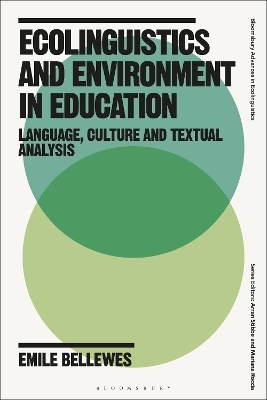
Ecolinguistics and Environment in Education
Language, Culture and Textual Analysis
Seiten
2024
Bloomsbury Academic (Verlag)
978-1-350-22934-1 (ISBN)
Bloomsbury Academic (Verlag)
978-1-350-22934-1 (ISBN)
In the age of ecological crisis, language and discourse are emerging as a new battleground in the environmental debate. With the rise of new environmentalist movements and their subsequent backlash, we are now exposed to a plethora of different and often opposing discourses on the environmental crisis and our relationship with nature. This book argues for the need to develop classroom practices which aid students in critically reviewing and evaluating different perspectives on discourses of environmentalism and sustainability.
Remarking that language and humanities teachers are perfectly positioned to play a key role in the development of eco-critical language awareness at this crucial juncture, this book explores how they can help students utilise a critical perspective to navigate the multitude of cultural messages regarding our relationship with nature. Employing ecolinguistics as a form of eco-critical pedagogy, Emile Bellewes presents key concepts underpinning ecolinguistics, before guiding readers through their application in the classroom. Serving as a bridge between critical perspectives on environmental education and forms of discourse analysis, Ecolinguistics and Environment in Education explains how ecolinguistics can be used to carry out detailed linguistic analyses of environmentally significant messages in the classroom.
Remarking that language and humanities teachers are perfectly positioned to play a key role in the development of eco-critical language awareness at this crucial juncture, this book explores how they can help students utilise a critical perspective to navigate the multitude of cultural messages regarding our relationship with nature. Employing ecolinguistics as a form of eco-critical pedagogy, Emile Bellewes presents key concepts underpinning ecolinguistics, before guiding readers through their application in the classroom. Serving as a bridge between critical perspectives on environmental education and forms of discourse analysis, Ecolinguistics and Environment in Education explains how ecolinguistics can be used to carry out detailed linguistic analyses of environmentally significant messages in the classroom.
Emile Bellewes is Lecturer of English Language and Linguistics at Linköping University, Sweden.
Introduction
1. Situating Ecolinguistics within the Humanities as a Form of Environmental Pedagogy Mental Models
2. Critical Approaches and Perspectives on Language and the Natural World
3. Ecolinguistics
4. Cultural Narratives and our Relationship with the Living World
5. Paulo Freire and Critical Pedagogy
6. Ecopedagogy
7. Ecojustice Education and Pedagogy of Responsibility
8. Creating Tasks for Eco-Critical Language Awareness
9. Setting out the Conceptual and Pedagogical Foundations for Working with Critical Language Awareness and Ecolinguistics in the Classroom
Conclusion
References
Index
| Erscheinungsdatum | 03.09.2024 |
|---|---|
| Reihe/Serie | Bloomsbury Advances in Ecolinguistics |
| Zusatzinfo | 10 bw illus |
| Verlagsort | London |
| Sprache | englisch |
| Maße | 156 x 234 mm |
| Themenwelt | Schulbuch / Wörterbuch ► Wörterbuch / Fremdsprachen |
| Geisteswissenschaften ► Sprach- / Literaturwissenschaft ► Sprachwissenschaft | |
| Naturwissenschaften ► Biologie ► Ökologie / Naturschutz | |
| ISBN-10 | 1-350-22934-2 / 1350229342 |
| ISBN-13 | 978-1-350-22934-1 / 9781350229341 |
| Zustand | Neuware |
| Haben Sie eine Frage zum Produkt? |
Mehr entdecken
aus dem Bereich
aus dem Bereich
Das umfassende Standardwerk auf der Grundlage der aktuellen amtlichen …
Buch | Hardcover (2024)
Duden (Cornelsen Verlag)
CHF 48,95


